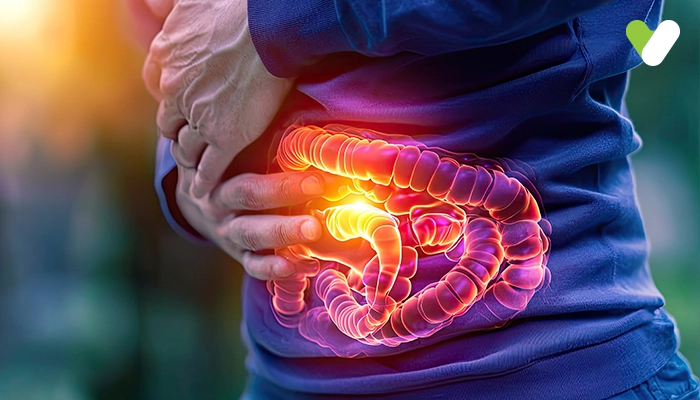Crohn's disease is a form of the intestinal disorder where the bowels swell up, causing a lot of pain and irritation. The symptoms may get quite complicated and can lead to serious flare-ups of stomach pain, diarrhoea, etc. There is no cure for the disease yet, but Crohn's treatment mainly consists of remedies and medications given to manage the symptoms and to alleviate the discomfort in the patient.
Understanding Crohn’s Disease
A patient suffering from Crohn’s disease is susceptible to swelling, blockage, and even bleeding in the intestinal tract. The ailment mainly affects the two intestines and the colon. It causes digestive problems such as extreme stomach pain, indigestion, loose motions, gas build-ups, and, in some cases, internal bleeding.Due to the swelling, the intestines and other organs such as the colon cannot function properly. Some blockages lead to the waste material remaining in the body. Subsequently, infections build up and flare within the digestive tracts. In severe cases, abscesses form and begin to bleed. The patient may also develop fissures that further cause discomfort and pain.
Sadly, there is no known Crohn's disease treatment yet, but some Crohn's disease medications help bring relief from the symptoms and prevent future outbreaks.
The Symptoms Of Crohn’s Disease
To understand you have the ailment and begin the Crohn's disease treatment, you first need to be aware of the symptoms.- Pain in the abdomen
- Diarrhoea
- Loss of appetite
- Feeling full
- Fever
- Weight loss
- Anal fissures
- Anal fistulas
- Bleeding from the rectum
If you are experiencing these symptoms regularly, you should meet your doctor on priority and get a diagnosis. If detected with Crohn’s, the doctor will start the treatment and put you on some Crohn's disease medications initially and then, if needed, proceed to another cure such as surgery.
When To Meet The Doctor?
If you have the symptoms and don't have a clear understanding of why you have them, it is a good idea to call your doctor. If left unattended, Crohn's disease can cause many secondary problems such as malnutrition and anaemia. Also, the illness is especially dangerous for pregnant women who may even suffer miscarriages due to it. So do not delay in meeting your doctor if you have the symptoms associated with Crohn’s disease.Diagnosis Of Crohn’s Disease
The doctor puts you through several tests, depending upon the severity of your symptoms to understand whether or not you have Crohn’s disease. If diagnosed, a Crohn's disease cure path is devised for you. To understand your condition the doctor may ask you to get the following done:- Stool test
- Blood test
- Colonoscopy
- Endoscopy
- Scans and x-rays
Once the doctor has diagnosed your condition you will be given the most suitable Crohn's disease cure path. This may include medication, lifestyle changes, surgery, etc.
Different Forms Of Crohn's Disease Treatment
As stated above, there is no fixed and permanent Crohn's treatment, but your health care provider can help you to feel better and manage the symptoms with the help of the following methods:1. Medicines
The most common cure for Crohn’s disease is through oral medicines. Crohn's disease medications include anti-diarrhoea medicines, antibiotics to control any infections, biologics used to suppress your immune system, and immunomodulators.2. Bowel Rest
If you have a severe bout of diarrhoea that leads to other complications such as bleeding, your doctor may stop you from eating and drinking for a few days to help your intestines to recuperate. At such a time, you may need to get admitted to a hospital and receive the nutrients you need through an IV channel.3. Surgery
Surgery is a less common, but effective method used in the management of Crohn’s disease. When the patient has abscesses and fissures due to Crohn’s, the doctor may require to operate and remove these obstructions for the bowels to function smoothly.4. Steroids
Steroids are given when the inflammation and subsequent bleeding are very severe. The inflammation is controlled by these medicines and this brings relief to the patient.Speak to your doctor and understand which Crohn's treatment path is best suited for you and then start with it to get relief from the symptoms.
Who Gets Crohn’s Disease And How To Prevent It?
Crohn’s disease commonly affects younger people, but it is not uncommon to see older people get it too. Mainly, people in their teens, twenties, and thirties are mainly vulnerable to this disorder. There is no specific reason that causes Crohn’s disease and this is precisely why the Crohn's disease cure is so hard to find.If you have the disease, then you will have to follow your doctor’s advice and get on the remedial path that he or she puts you on. This apart, you can also make some lifestyle changes to help your body, mainly your digestive tract, to function better. These include:
- Stop smoking
- Eat less fatty and spicy food items to reduce the stress on the digestive system
- Eat on time and follow a healthy diet routine so that your body can adjust to the digestive patterns
- Exercise regularly to stop the build-up of fat which can contribute to the inflammation in your internal organs
- Avoid stress and keep your mind clear of worries
Follow these simple steps and you will find it easier to manage the symptoms and live a pain-free life.


